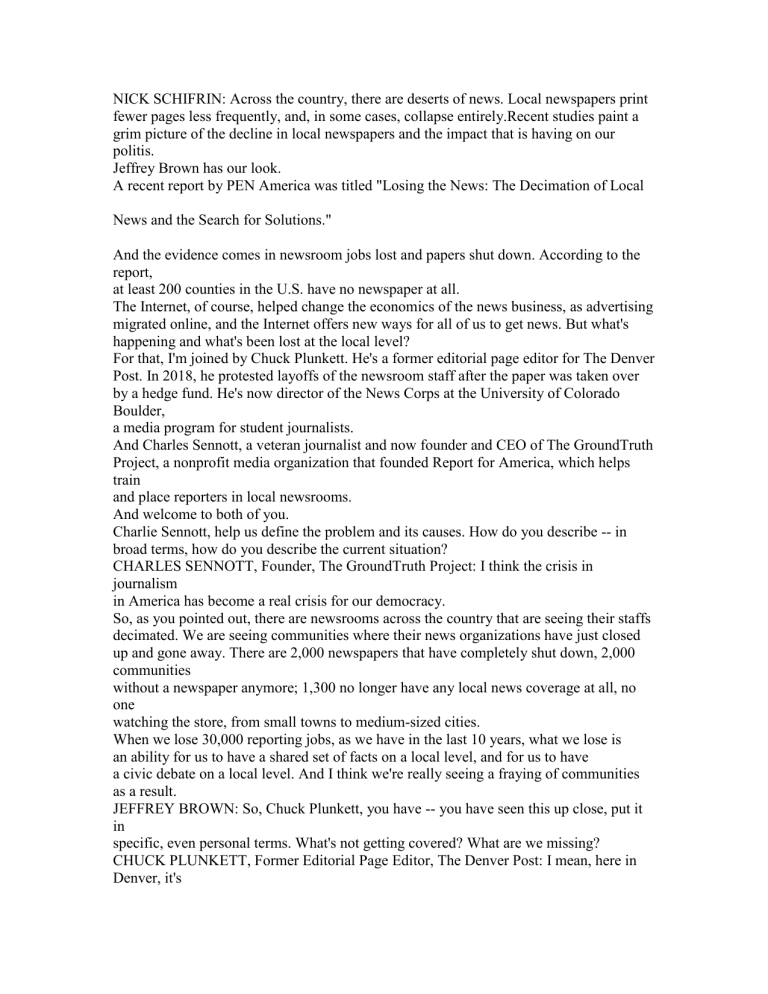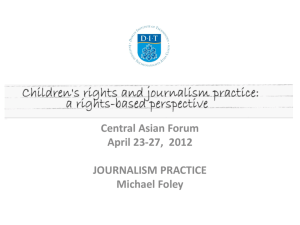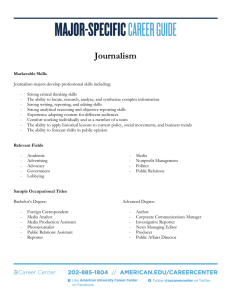
NICK SCHIFRIN: Across the country, there are deserts of news. Local newspapers print fewer pages less frequently, and, in some cases, collapse entirely.Recent studies paint a grim picture of the decline in local newspapers and the impact that is having on our politis. Jeffrey Brown has our look. A recent report by PEN America was titled "Losing the News: The Decimation of Local News and the Search for Solutions." And the evidence comes in newsroom jobs lost and papers shut down. According to the report, at least 200 counties in the U.S. have no newspaper at all. The Internet, of course, helped change the economics of the news business, as advertising migrated online, and the Internet offers new ways for all of us to get news. But what's happening and what's been lost at the local level? For that, I'm joined by Chuck Plunkett. He's a former editorial page editor for The Denver Post. In 2018, he protested layoffs of the newsroom staff after the paper was taken over by a hedge fund. He's now director of the News Corps at the University of Colorado Boulder, a media program for student journalists. And Charles Sennott, a veteran journalist and now founder and CEO of The GroundTruth Project, a nonprofit media organization that founded Report for America, which helps train and place reporters in local newsrooms. And welcome to both of you. Charlie Sennott, help us define the problem and its causes. How do you describe -- in broad terms, how do you describe the current situation? CHARLES SENNOTT, Founder, The GroundTruth Project: I think the crisis in journalism in America has become a real crisis for our democracy. So, as you pointed out, there are newsrooms across the country that are seeing their staffs decimated. We are seeing communities where their news organizations have just closed up and gone away. There are 2,000 newspapers that have completely shut down, 2,000 communities without a newspaper anymore; 1,300 no longer have any local news coverage at all, no one watching the store, from small towns to medium-sized cities. When we lose 30,000 reporting jobs, as we have in the last 10 years, what we lose is an ability for us to have a shared set of facts on a local level, and for us to have a civic debate on a local level. And I think we're really seeing a fraying of communities as a result. JEFFREY BROWN: So, Chuck Plunkett, you have -- you have seen this up close, put it in specific, even personal terms. What's not getting covered? What are we missing? CHUCK PLUNKETT, Former Editorial Page Editor, The Denver Post: I mean, here in Denver, it's a perfect example. And it's happened across the country. When I started at The Post in 2003, there were nearly 300 journalists. And now there are 70. And that means there are fewer reporters covering the city hall, covering the statehouse, covering the important beats like cops and business. Studies have shown that, when there are fewer reporters in communities, that corruption inevitably starts to grow, taxes start to go up, voter participation starts to drop. JEFFREY BROWN: I mentioned, of course, the changing business model. And you both have watched that. So, in the interim, in some of the solutions -- Charlie, you're addressing one of them as part of this nonprofit movement. Tell us what you -- tell us about your project. CHARLES SENNOTT: Sure. So, what we're trying to say is, we need to have a movement to confront this challenge to local reporting in America. So we started Report for America as a real service project to say, this is a call to service for a new generation of journalists to come forward and serve these local communities. As Chuck pointed out, there's greet needs to cover education, to cover health issues, to cover rural areas where no one is really having their story told. So what we are trying to do is create a kind of a Teach for America or City Year for journalism and to deploy young journalists in the host newsroom. Those host newsrooms will now take in 250 Report for America corps members, as we call them. And we're really trying to put boots on the ground, so that we can say the best way to confront this crisis is going to be with real human beings doing real reporting and answering that need. JEFFREY BROWN: Chuck, if the economics don't work so well anymore, the way they traditionally did for your industry, is it only projects like that, nonprofit, experimental, relatively small, even if trying to -- even if having an impact in? CHUCK PLUNKETT: Every little bit helps, Jeff. 4:30 But I fear that we need something much bigger than that, that for years and years and years, 4:36 before the rise of the Internet and things like Craigslist and Facebook, the rule of 4:41 thumb was that traditional newspapers got 80 percent of their revenue from pricey print 4:46 ads and classifieds and things like that. 4:49 And so now, when ads shift to online and people can go to Craigslist, that revenue just evaporates. 4:55 So, The Denver Post, that had top level editors and top level reporters and investigative 5:02 reporters and photojournalists, and the whole ballpark, suddenly, you find them in a situation 5:08 where they need a lot more money to be able to pay the bills. 5:12 And trying to go this subscription model or the nonprofit model, the different courageous 5:18 experiments that you're seeing out there, isn't really getting the job done. 5:23 I came around to the idea that a public funding option to help subsidize, to help backfill 5:30 some of that 80 percent of the revenue that has been lost is going to be critically important 5:34 to keeping our democracy alive and healthy. 5:38 And we need our watchdogs. We need the people who are journalistically trained to get out 5:43 there. You need a source that you can go to that's reliable, that speaks for the community, 5:47 that's been trusted and is considered one of the most plugged-in members of the community, 5:50 like a Denver Post. 5:51 JEFFREY BROWN: We're talking economics, of course, but we're also in a time where journalism, 5:57 journalists are -- these are contested areas. Facts and truth are contested. 6:02 And you're both now working with young people. You're working with what you hope is a new 6:07 generation of journalists. 6:08 Charlie, what do you say to people coming into this? 6:12 CHARLES SENNOTT: What we say to young people is, look, you can go into a community, and 6:17 you can be of service to that community, and you can change things. 6:20 Right now, too many communities have no one watching the store. There's great journalism 6:25 that can be done to go out into these communities and uncover really important stories that 6:30 matter to the community. 6:31 So, Jeff, you and I came of an age when journalism had a big future to it, and you could get 6:35 into these jobs. We want to restore the pipeline for a new generation of journalists to come 6:40 forward. And we really want to urge them to apply. 6:43 You go to ReportforAmerica.org and apply for these positions. 6:47 JEFFREY BROWN: Chuck, you're working at a university now, so you're with young people. 6:52 What are they coming to you for, and what are you saying to them? 6:55 CHUCK PLUNKETT: Our students have a lot of passion. They look at the world that they 6:58 live in, and they fear that it's chaotic, and that it's full of tricksters. 7:02 And a lot of -- as much as the Internet gives us wonderful information and tools to use, 7:06 it also brings a lot of mischievous activity. And they look at the state of the country, 7:12 and they see that there's a lot of disconnect and a lot of anger. 7:15 And they have a real passion for wanting to do something about it and get involved and 7:19 be able to develop the skills that it takes to go far beyond the kind of citizen journalism 7:25 that's needed. 7:26 JEFFREY BROWN: Chuck Plunkett and Charles Sennott, thank you both very much, and happy 7:29 new year. 7:30 CHUCK PLUNKETT: Happy new year to you. 7:31 CHARLES SENNOTT: Thank you. Happy new year.



